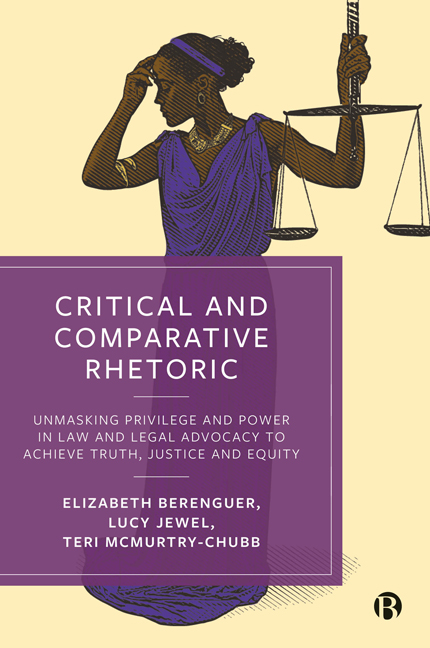 Critical and Comparative Rhetoric
Critical and Comparative Rhetoric Book contents
- Frontmatter
- Contents
- Detailed Contents
- List of Figures and Tables
- About the Authors
- Introduction
- 1 What’s Wrong with Aristotle?
- 2 Problematizing Aristotle: Renovating and Remodeling Traditional Legal Rhetoric
- 3 Shifting the Focus from the West
- 4 Multicultural Rhetorics
- 5 Reproducing the Canon, Reproducing Inequity (Traditional Rhetoric)
- 6 Interrupting the Canon
- 7 Disrupting the Canon: Multicultural Rhetorical Strategies in Action
- References
- Index
7 - Disrupting the Canon: Multicultural Rhetorical Strategies in Action
Published online by Cambridge University Press: 18 January 2024
- Frontmatter
- Contents
- Detailed Contents
- List of Figures and Tables
- About the Authors
- Introduction
- 1 What’s Wrong with Aristotle?
- 2 Problematizing Aristotle: Renovating and Remodeling Traditional Legal Rhetoric
- 3 Shifting the Focus from the West
- 4 Multicultural Rhetorics
- 5 Reproducing the Canon, Reproducing Inequity (Traditional Rhetoric)
- 6 Interrupting the Canon
- 7 Disrupting the Canon: Multicultural Rhetorical Strategies in Action
- References
- Index
Summary
Rethinking how we “do” law
Chapter 4 provides comprehensive explanations and tabular summaries of Indigenous, African and Asian Diasporic, and Latine reasoning and analytic paradigms. The next step is thinking through integration of these strategies into how we “do” law, practice law and advocacy, in drafting various legal genres (pleadings, memos, briefs, judicial opinions) with an eye toward changing our practice to “make space” for the knowledge and experiences of minoritized persons.
The universe in which invocations for justice function is vibrant, innovative, and capacious enough to hold the rhetorical traditions of multiple groups, whereas the universe in which law functions is flat, two-dimensional, and calibrated to White cultural hegemony (Figures 7.1 and 7.2). As such, it can hold no space for cultural traditions that assert themselves as equal. It will remain unchanged to the extent that in its current form it can only accept these traditions, as it has accepted its people, through assimilation into what is ideologically “American.” Recall the words of George Washington quoted by Michigan Congressman Grant M. Hudson as he advocated for the Immigration Act of 1924 (as recounted in Chapter 3), “Citizens by birth or choice, of common country, that country has a right to concentrate your affection … with slight shades of difference, you have the same religion, manners, habits, and political principals.”
In order to put the multicultural rhetorical traditions to work in the service of justice, we must shift our focus to how we draft legal genres. By assessing the parts of the most common legal genres taught to law students and drafted by attorneys, we can best determine where these traditions can serve as interventions to disrupt— break apart, destroy, disorder— Western rhetorical devices, reasoning, and analytic forms.
Multicultural rhetoric in action
What follows are “maps” of various genres, by type and with a description of each of its parts, along with a list of multicultural rhetorical strategies that can be used in each part. After each map is an exercise that provides the opportunity for you to put multicultural rhetoric in action.
- Type
- Chapter
- Information
- Critical and Comparative RhetoricUnmasking Privilege and Power in Law and Legal Advocacy to Achieve Truth, Justice, and Equity, pp. 205 - 276Publisher: Bristol University PressPrint publication year: 2023


